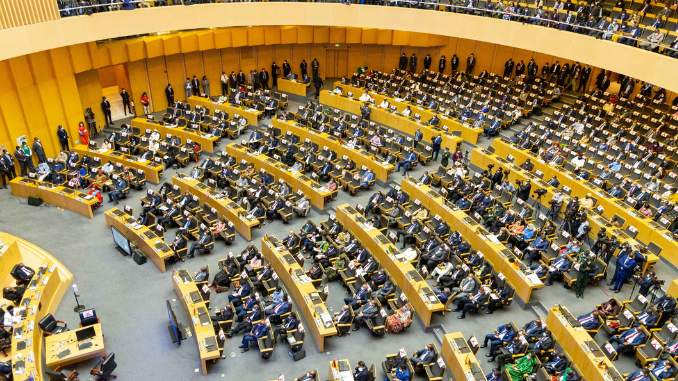On Sunday, February 6, the African Union (AU) announced the suspension of the debate over Israel’s observer status, following objections raised by member countries over Israeli occupation and oppression of Palestinians. The decision was reached at the AU summit, held in Addis Ababa, where the heads of state of the 55-member body met for two days. On Saturday, Palestinian Prime Minister, Mohammad Shtayyeh, who is also attending the summit, urged the AU to withdraw Israel’s observer status. According to Shtayyeh, Israel should “never be rewarded for its violation and for the apartheid regime it does impose on the Palestinian people.”
Newly elected AU chairman Macky Sall of Senegal said that a scheduled vote on Israel’s observer status has been postponed until the next summit in 2023, telling reporters that “this issue can divide us, Africa cannot be divided.” Sall added that the AU has formed a committee with the aim of reaching a consensus. The committee will include member-states such as Algeria, South Africa, Democratic Republic of the Congo (DRC), Nigeria, Rwanda, and Cameroon, along with the chairman. Two of these countries, Rwanda and the DRC, supported Israel’s observer status.
The decision, last year in July, by outgoing AU chairman Moussa Faki Mahamat, had ignited protests from countries such as South Africa and Algeria, who had said that they were not consulted. The nations called the decision ‘unjust’, ‘unilateral’ and ‘shocking’, claiming that it directly contradicts multiple AU statements unanimously agreed upon in the past in support of Palestinian liberation and statehood. Other states opposed to Israel’s membership to the organization include Nigeria, Egypt, Comoros, Tunisia, Djibouti, Mauritania, and Libya, several of whom have also signed a petition to have Israel’s membership removed.
The @_AfricanUnion has done the right thing to suspend #Israel in line with member state obligations under the Apartheid Convention. It would be particularly grotesque for Africa, which understands well the scourge of apartheid, to grant an apartheid state privileges and status. https://t.co/yNdmnfOe6t
— Sarah Leah Whitson (@sarahleah1) February 6, 2022
The decision by the AU was welcomed by many. The Palestinian Foreign Ministry thanked the AU for “standing by the Palestinian right, foremost Algeria, South Africa, and Nigeria, and the Southern African Development Community (SADC) countries for their role in refusing to grant Israel the observer status.” The ministry called the AU’s decision another “step on the path to pressure Israel to end its occupation of Palestinian land and stop its continuous violations of the right of the Palestinian people, and an explicit call for it to comply with the United Nations resolutions.”
In a statement, the Arab League called the decision a correction of the “previous individual position of the African Union Chairperson Moussa Faki, and affirmed that African support for the Palestinian cause and the legitimate rights of the Palestinian people will not be drained and will not be affected by any attempts of the Israeli occupation.”
Israel had lobbied different African governments with trade and arms deals for decades in order to obtain observer status. For Israel, obtaining the status was a significant diplomatic victory. It followed the Abraham Accords which saw countries such as the UAE, Bahrain, Morocco and Sudan (in a separate agreement) normalizing ties with Israel.





